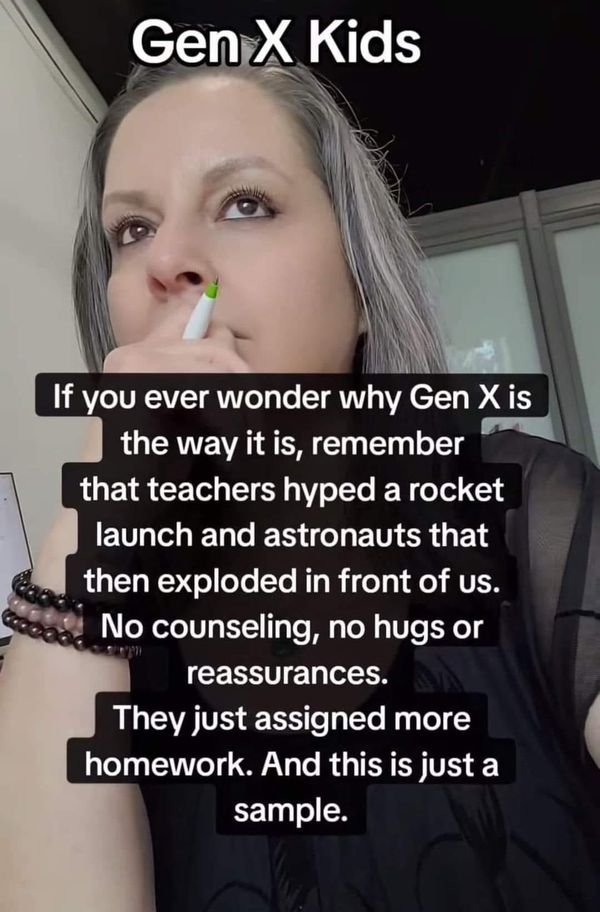For the baby boomer generation, the question “Where were you when JFK was shot?” evokes a core memory. For Gen Xers, it’s “Where were you when the Challenger exploded?” Nearly four decades later, most of us can still recall where we were when the tragic mission went terribly wrong.
Most of us were in classrooms. The space shuttle mission had been hyped in schools across the country for months, as high school teacher Christa McAuliffe had been chosen from 11,000 applicants to become the first civilian in space. McAuliffe had done countless interviews and been part of news and television specials showing how she was being trained for the mission, and by the time of the launch, she’d become a household name.

On January 28, 1986, millions of children across the country were eagerly watching the live TV feed in their classrooms when the Space Shuttle Challenger exploded mid-air, just 73 seconds after liftoff. Confusion followed by shock and horror set in as we realized that we’d just watched seven people die in real time—six astronauts, who held almost god-like status for kids in the 1980s, and a woman who could have been any of our favorite teachers.
I was in 5th grade. My teacher cried. Then she turned off the television and we just…went back to class.
Gen X is sometimes referred to as the forgotten generation—the latchkey kids raised by two working parents who learned to be independent as well as cynical and aloof due to benign neglect. But as a social media meme points out, the Challenger tragedy and aftermath serves as an example of why we are the way we are.
The meme shared by Gen X Only on Facebook reads, “If you ever wonder why Gen X is the way it is, remember that teachers hyped a rocket launch and astronauts that then exploded in front of us. No counseling, no hugs or reassurances. They just assigned more homework. And this is just a sample.”

Gen Xers in the comments then shared their memories of that day, and they do make one wonder how differently schools would respond if the same thing happened today. Mental health wasn’t a big focus in schools in the 80s, and the idea that kids were traumatized by what they saw and might need some help processing it barely seemed like a blip on the radar.
“Saw it in my 4th grade class with my favorite teacher Ms.waters , I just remember my teacher crying and walking out of the classroom .I was super confused I remember that, I know what we just watched wasn’t normal! and we went on with our day literally, no mention of it I don’t remember at home or anything.” – Stacey R.
“Yep, saw it live, then they turned off tv and went on with class. Not sure what the guidance counselors did in those days??!!” – Kim M.
“I’ll never forget this.I was in Spanish class, watching.When it exploded, there was gasps and silent confusion….Silence for what felt like forever. Spanish teacher broke from her rule of Spanish only in class. She looked at us with tears rolling down her face and said, “I can’t believe that just happened…..(turns off TV, wipes tears) please pull out your book and turn to page (whatever it was)”.And that was that.” – Kelli L.
“It was traumatic! The TV gets rolled in on its cart. We learn all about the average person on the flight, a teacher, I mean how cool you can be a teacher and go to space. Classroom is all a buzz as we count down with the TV 3, 2, 1! Then wham giant explosion, wait, hold up, did everyone just die? Everyone, even the teacher is in total shock, the TV is still on as we hear them say the Space Shuttle Challenger exploded, and there are no survivors. We all just sat in shock. I don’t think it sank in for some of the kids what we had just witnessed. For those of us that understood it was a very strange day, a very strange few days. NOBODY talked about what we had witnessed. We just went through the motions of school, without any help to process it. We never watched any shuttle take off after that, and we used to watch all of them. When the TV got rolled in there wasn’t as much excitement as usual for the rest of the school year. And we all just moved on, because we didn’t know what else to do, the adults just acted like it didn’t happen.” – Lori G.
“I was in 3rd grade…I remember watching it in class after spending all week doing special projects because an ‘average’ person who was a teacher was gonna get to go to space…it blew up and we thought there was a fireworks show because of how special this launch was hyped to be…And then we went about our day..” – David K.
Millennials had 9/11 as kids. Gen Z has seen school shooting after school shooting. Both Gen Z and Gen Alpha had the COVID pandemic onset as a core childhood memory.
But those younger generations have grown up with much more sensitivity and adult awareness when it comes to mental health issues. Teachers have more training in trauma and there’s a better understanding that kids could be affected emotionally by witnessing something like the Challenger disaster. Some schools and classes held remembrances and memorials for the Challenger crew, planting trees in their honor and whatnot, which may have helped bring some closure to the event for some. But for many Gen X kids, all we remember was the horror of it happening and then a complete lack of any kind of processing of it—just a near-immediate moving on.
Was the unspoken “Life is tough, move on” message we received through that experience helpful or harmful to Gen Xers’ development? Who knows. There’s a fine line between traumatizing and toughening, and that line is likely different for each person. But it’s interesting to think about how differently that event might be handled today with our greater grasp of how trauma works and knowing how weird it was to have so little acknowledgment of it at the time.






































